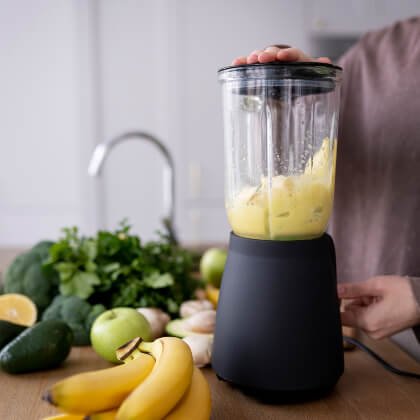How Do I Choose A Kitchen Blender?

Shopping for the perfect kitchen blender can be a breeze for some, but for many, it can turn into a daunting task. With an overwhelming array of models and brands available on the market, each boasting various features and capabilities, the process of choosing the right one can feel quite challenging. Whether you’re looking for a basic blender for simple smoothies or a high-powered model for more complex culinary tasks, the options seem endless.
In this article, we will delve into the essential components to consider when selecting a blender, breaking down each feature to help you understand what to look for. By the end, you will be equipped with the knowledge to make a well-informed decision that suits your specific needs and preferences.
Consider Your Usage
How you plan on using your blender should be the first consideration. If you're an avid smoothie lover in search of the perfect blend or a culinary enthusiast aiming to experiment with soups and sauces, identifying your blending needs can help narrow down the types of blenders that would suit you. Determine whether you're looking for a heavy-duty, full-sized blender or a smaller, personal blender, suitable for whipping up quick smoothies or protein shakes.
Next, consider the frequency of usage. If you're planning on using it daily, you might want to invest in a more durable standard blender. On the other hand, if you’re just an occasional user, a less expensive alternative and eco-friendly option would be to rent a refurbished blender from a reputable service provider.
Finally, consider the types of ingredients that you frequently blend. Heavy-duty blenders can handle frozen ingredients and ice better, while a lighter duty blender might suffice for softer ingredients and liquids.
Check the Specifications
Understanding the specifications of the blenders available in the market can help you to make your blender choice. First, check the blender’s power. Power, denoted in watts, determines how well the blender can handle tough ingredients. Higher wattage means stronger motor operation.
The next specification to watch out for is the blender's capacity. The size of the blender's jar is vital, especially if you're planning to prepare large batches of your food or drink. Make sure you opt for a blender that can cater to your quantity needs.
Finally, familiarize yourself with the blender's speed settings and functionalities. Try to go for a blender that offers multiple speeds and functions for a versatile blending experience. Some even come with auto-clean features which can be a deciding factor for those who value convenience.
Examine the Quality and Warranty
The quality of a blender is perhaps one of the most significant deciding factors. Check the blades' quality and the material with which the blender's jug is made. Stainless steel blades are preferred for durability, while a glass or BPA-free plastic jug is deemed safer for food contact.
Always take the time to assess the warranty extended by the brand. Good warranties offer better peace of mind, especially when investing in a high-end blender. Look for comprehensive warranty coverages that cover motor failures or damage to the blender parts.
In Conclusion
Choosing the perfect blender depends upon your individual requirement, the specifications of the blender, and its quality and warranty. Whether you’re an everyday smoothie drinker or an occasional cook, understanding what to look for in a blender can make your buying or renting experience smoother.
At this point, you should be equipped enough to make an informed choice. If you're looking to reduce your environmental footprint, consider renting a refurbished or second-hand blender from our range of appliances at your next requirement. This option not only reduces unnecessary purchasing but also contributes to promoting a sustainable lifestyle. Happy blending!
